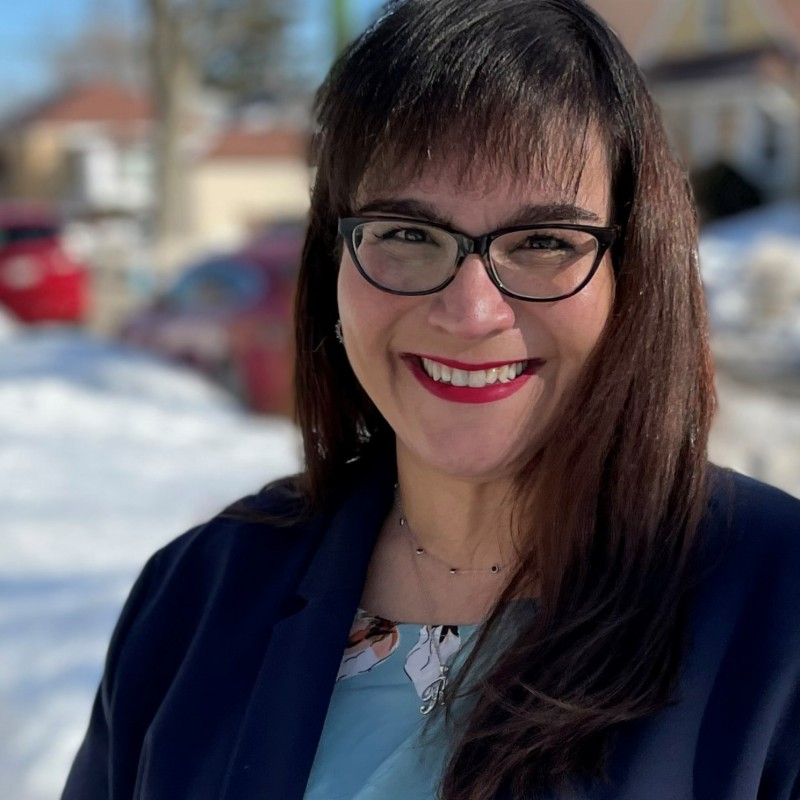Tricia Rosado, MA is Director Caminos al Éxito, a Developing Hispanic-Serving Institutions (Title V) cooperative grant, at Northeastern Illinois University which works with Northeastern Illinois University, Wright College, and 13 Chicago Public Schools to solidify partnerships that support Latinx college students (first-time and transfer) and their families from enrollment to graduation.

Overall, she has led college access initiatives for nearly three decades of leadership in bringing together upper-level and local administration in higher education institutions, Chicago Public School, and non-profit organizations in various communities across Chicago.
- Where did you earn your degree(s)? Types of degree(s) and field(s) of study?
I received my Bachelor of Arts degree from DePaul University (Sociology), my Master’s of Arts degree from Northeastern Illinois University (Higher Education Leadership- ENLACE Program), and I am in the proposal phase of my Doctorate degree from Illinois State University (Educational Administration and Foundation Department- Leadership, Equity, and Inquiry Program).
- How did your college/university support your success in earning your degree(s)?
My undergraduate experience was very similar to the literature on first-in-their- family students. While I had a supportive family and community, and DePaul was a great fit for me, there were things about the university I did not understand. It was my community of friends who helped me navigate and graduate on-time.
NEIU’s ENLACE Program was significantly different. From the very beginning, our Latinx cohort was surrounded by faculty, administrators, and alumni whose lived and professional experiences mirrored our own. It was an authentic learning environment and, to this day, we continue to support each other personally and professionally.
I am still in the proposal phase of the dissertation at Illinois State University. It’s been complicated; the distance, the pandemic, and “life” have made this a difficult journey. It’s my community of “hermanas/os” who have provided the continuous support I need to complete my doctorate.
- What excites you about equity work at your institution?
Northeastern Illinois University was designated a Hispanic-Serving Institution in 1997 and has consistently been an ethnically diverse campus. We have student support programs, campuses in various communities, as well other grants and programs that are working to ensure we retain and graduate students. I’m very excited about the department I work for- the Center for College Access and Success (CCAS) which has been a leader in equitable, diverse, and inclusive practices for over 80,000 students, their families, and school students, educators, schools, and communities.
It has been exciting to see NEIU’s equity, diversity, and inclusion initiatives grow and become part of the campus wide culture. NEIU’s ILEA equity plan has solidified our future vision and institutional strategies. Inaugural Executive Director Dr. Shireen Roshanravan has been inclusive of faculty, staff, and students in various conversations, campus activities, and special events.
- What does it mean to be a woman leader of color in higher education today?
In 1997 Dr. Estela R. Lopez, a Borinqueña, was the Provost of NEIU. As a Latina whose familia is from Puerto Rico, it was a moment of pride and aspiration to experience her leadership. At the time I didn’t realize how rare an occurrence this was. While Latinas can be found in entry/mid level and director positions, they are noticeably absent from executive-level positions. I feel this is changing for the better, as there are many more Latinas pursuing/receiving terminal degrees and finding the necessary mentorship.
I truly believe representation matters and as a Latina in a leadership position I want to connect in as many ways possible with others. Our Caminos al Éxito grant embraces the lived and professional experiences of everyone as well as practices distributive leadership to ensure all levels of staff take on leadership roles. The grant also collaborates and partners with over thirty different departments, work teams, and high schools. I’ve been invited to share our culturally responsive practices at several events this year, including the 2023 ILEA Equity Institute and 2023 AHSIE Conference. I serve on several committees at NEIU including the Council on the Status of Latinos (CSL). I continue to support the ENLACE program by attending various events a year. Throughout these experiences it has been very important for me to remain true to my cultural identity which includes using Spanish and using cuentos to share learning experiences.
- In your role, how do you impact equitable outcomes for your students?
The goal of the Caminos al Exito grant is to close equity gaps connected to student success and retention during the critical phases of outreach, enrollment, transfer, and graduation. We’ve worked to ensure equitable outcomes for students and their families by recruiting, hiring, and orientating diverse staff whose lived experiences mirror our communities. We create culturally responsive practices like serving students at their high school and in the language of preference (Spanish, bilingual, English). We keep our promesa to our communities, by implementing strengths-based initiatives and our practices are based in servingness and lead to the reduction of systemic inequities. Lastly, I’ve created the C.O.D.E. (Conocimiento, Oportunidades, Dignidad, y Equidad) as a framework to honor the inherent knowledge and cultural wealth of students/families and ensure all practices are respectful, equitable, and inclusive of the community.

